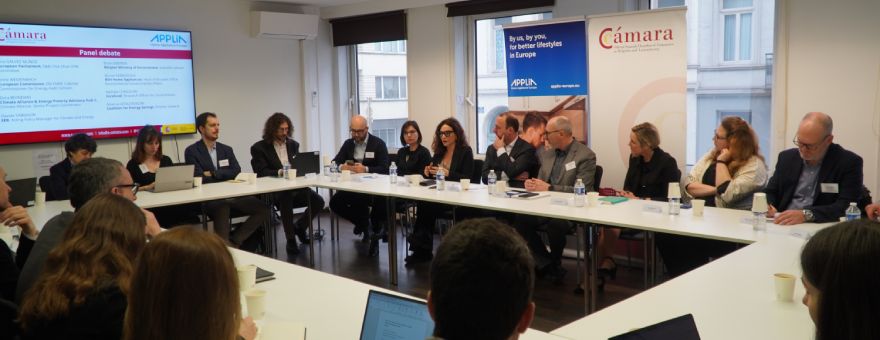The Chamber hosts a panel debate on Energy Poverty
On Friday 22nd March, the Official Spanish Chamber of Commerce in Belgium and Luxembourg held a breakfast-debate in collaboration with its member company APPLiA to address the topic of “Energy Poverty” in the EU. The debate, held in the form of a panel discussion, brought together stakeholders from different institutions and organisations to give insight into how this issue is being addressed.
The President of the Chamber, Pablo López-Álvarez, opened the event by highlighting the importance of the topic and introducing Paolo Falcioni, director general of APPLiA. Next, Falcioni pointed out the magnitude of the issue, explaining that at least 42% of Europeans do not own a dishwasher, which not only leads to more waste, but also to time poverty. According to the information presented, if the entire EU population would own a dishwasher, the potential savings compared to washing dishes by hand would amount to the equivalent of twice the electricity consumption of Portugal and 2,5 million Olympic size swimming pools. Low-income households are often the most affected by the impact of climate change, if they are left behind or burdened with higher energy costs, climate initiatives will not succeed. For this reason, making advanced sustainable technologies accessible and affordable to all is a key component of achieving climate neutrality. In this sense, Falcioni recalled the three dimensions of sustainability: environmental, social and economic.
Then, each of the panellists had the opportunity to share their perspectives on the issue.

Anne Weidenbach during her intervention. / APPLiA
Lina Gálvez, MEP, addressed her work tackling household inequality and adding a gender dimension to policies regarding energy poverty. Due to the care specialization of women, they are more likely to become the heads of single-parent families, which are more susceptible to this kind of poverty.
Anne Weidenbach, member of cabinet of Commissioner for Energy, Kadri Simson, at the European Commission, said that as the numbers of energy poverty in the EU have increased, the Member States are being encouraged to step in and to come up with structured measures. One key suggestion is to hire experts to give advice and support to citizens on which home appliances to buy.
Dora Biondani, project manager at the EU Energy Poverty Advisory Hub, explained that it is essential to empower communities at the local level and give the opportunity to customize social policies depending on the region.
Bram Soenen, scientific advisor at the Belgian Ministry of Environment, introduced the issue of the difficulty to access energy efficient appliances due to the upfront costs. He said that three essential tools to enable consumers to choose these options are information, knowledge and access to finance.
Bruno Vermoesen, head of Brussels Office Environmental Governmental Affairs at BSH Home Appliances, shared this view, and explained how through the Papillon Project, an initiative they have implemented with the social enterprise SAAMO, they aim at mitigating the problem by giving access to resource-efficient home appliances to low-income families.
Michele Consolini, research officer for Social Policies at Eurofund, made the distinction between what is EU competency vs what the EU is not good at. In the former he included supply chain control, tracking the amount of carbon used to make a product and procuring green raw materials. For the latter he conceded that Member States have the ability to launch more nuanced and focused investigations.
Arianna Vitali, director general at The Coalition for Energy Savings, listed the measures needed to make energy efficient technologies available for everyone: advice and targeted help. She suggested giving incentives to the best performing services and improving education so both the financial and environmental benefits of this technology become clear.
Davide Sabbadin, acting policy manager for Climate and Energy at EEB, highlighted that this technology is a “win-win” investment: it is better for citizens, for the environment and for reaching the Green Deal’s objectives, which at its core include eradicating energy poverty. He presented the idea that member states should have no interest loans to make them accessible.
After the closing statements by Anne Weidenbach and Paolo Falcioni, the floor was opened for questions. This prompted an insightful discussion on the intersectionality of the issue of energy poverty, the importance of local policy making and the global impact of the steps the EU is taking to tackle the problem.


